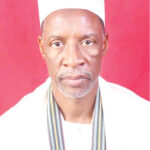Alex Enemanna
Our dear country Nigeria is undoubtedly one nation that has perennially occupied a back seat in the campaign to harness the numerous potentials inherent in the women folk for national renaissance, rebirth and reconciliation.
The United Nations statistics show that 70 percent of the 1.3 billion people living in conditions of poverty are women. Also in urban areas, 40 percent of the poorest households are headed by women. Additionally, 50-80 percent of women predominate in food production but they own less than 10 percent of the land. Interestingly, 80 percent of those displaced by climate related disasters and changes around the world are women and girls.
- Humanitarian crisis worsens in Niger as IDPs troop to state capital
- JUST IN: Saudi lifts COVID-19 restriction after two years, says one million Muslims to perform 2022 hajj
Whether deliberate or unconscious, the bias makes it difficult for women to move ahead. Knowing that bias exists isn’t enough; action is needed to level the playing field. Until the necessary action is taken and all hands-on deck to fight the bias, gender inequality and deliberate relegation of women to the background will continue to be a bane to sustainable progress in the world at large.
In the face of glaring male dominance and overwhelming domination, women have continued to hold the sceptre of optimism high, with the belief that a day of fair deal for them in the project Nigeria beckons. They have been the backbone of peace, love and unity at our homes. As caregivers, they use their God-given potential to nurse and raise beautiful children we proudly show off everywhere — social media, religious gatherings, workplace, shopping mall and just to anyone we come across. They put in their signature of excellence in the affairs of the kitchen to prepare a table of sumptuousness that we may live healthy and happily.
They are not missing in lending their modest support to ensure the development of our communities. In the part of Igbo land where this contributor was raised, apart from observing a weekly sanitation exercise, women in the community also ensure that they have projects attributable to their names either by way of road rehabilitation, community hall or school block renovation.
Women generally wield humongous influence in efforts to lubricate the country’s economy with their visible presence in the small and medium scale sub-sector of the economy.
Hardly is there any sector in the country where women are not making a significant impact as a demonstration of their ingenuity and acumen in breeding life into seemingly hopeless situations. In the banking sector for instance, they have steadily made waves which clearly signposts how prepared they are in the leadership question.
Today, there are no fewer than 5 female top executives in the banking industry who have through decades of toils and hard work hit the peak of their career. They include Ireti Samuel-Ogbu of Citibank Nigeria Limited; Tomi Somefun of Unity Bank; Nneka Onyeali-Ikpe of Fidelity Bank; Miriam Olusanya of Gtbank; Yemisi Edun of FCMB, and Halima Buba of SunTrust Bank.
The maritime sector is not left out as names such as Vicky Haastrup, Wunmi Eniola-Jegede, Aisha Ali-Ibrahim, Margaret Orakwusi, Eunice Ezeoke, Felicia Mogo and Chizoba Anyika continue to remind us of the enormous capacity our dear women are graciously blessed with.
Sadly, years of amplified advocacy to have more women at the top echelon of governance at both the state and national level has met the brick wall for unexplained reasons. Again, the National Assembly on March 1, 2022, just few days to International Women’s Day missed an opportunities to give women a break from the grip of discrimination which they have perennially suffered with its rejection of five gender Bills. It did not only send a chill down our spine, it demonstrated how opaque the ninth National Assembly is in the discourse to broaden the horizon for women participation in governance.
The Bills seeking to reserve special seats for women at the National and State Houses of Assembly, provide for affirmative action for women in political party administration, and grant citizenship to foreign-born husbands of a Nigerian woman would have been a perfect opportunity to make a loud statement to the global community that Nigeria is ready to purge itself of fruitless years of male dominance in the polity.
It was to allow for the domestication and prohibition of all forms of discrimination against women, with the aim to create gender parity and end negative gender stereotypes. More disappointing, months of intense lobbying, sensitisation, consultation, and advocacy, which at various occasions had wives of the President and vice president, Aisha Buhari and Dolapo Osinbajo respectively practically genuflect before the parliamentarians turned out to be efforts in futility.
This is happening at a time when other countries, even right under our nose are making frantic progress to enhance women inclusion in governance.
In Pakistan, under the leadership of the first female Speaker of the National Assembly, the first-ever bipartisan Caucus of Women Parliamentarians has enabled its members to work jointly for the cause of women in Pakistan.
Spain and Sweden are also in good records for ensuring a significant presence of women, especially in the parliament. Same cannot be said of Nigeria where there is rather a drastic reduction in the number of female representatives at both state and National Assembly. This negates the concept of democracy which only achieves true and dynamic significance when political policies and national legislation are decided jointly by men and women with equitable regard for the interests and aptitudes of both halves of the population.
It is interesting to note that the National Assembly has promised to revisit the rejected Bills with the aim of setting a legal framework for a conducive atmosphere for women to live, thrive and contribute their utmost best in the country’s development without their natural configuration as women being a barrier. Until that is done, we have remained a nation that has treated the women folk unfairly and the unfortunate action of the National Assembly will remain a regrettable one.
Enemanna writes from Abuja

 Join Daily Trust WhatsApp Community For Quick Access To News and Happenings Around You.
Join Daily Trust WhatsApp Community For Quick Access To News and Happenings Around You.


